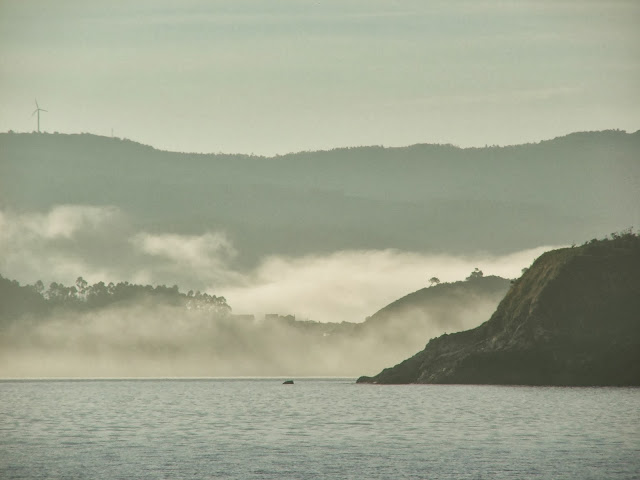Saturday night:
We’re now on passage from Pwllheli to northern Spain,
ideally Vigo. I’m writing this close to
Ouessant (France), in very calm seas, motoring with 4kts of wind. We’re having a Biscay crossing that is the
polar opposite of the “horror story” reputation Biscay has. Since leaving Pwllheli we’ve had a mix of
headwinds, fairwinds and calms going south along the Irish Sea, and anchored at
Dale (near Milford Haven) for 36 hours to see out some stronger unfavourable
winds. Since then it’s been a
straightforward trip around Land’s End and across the channel in fog, and now
we’re heading as far east as we can to get the best angle on the ESE winds that
are expected to start tomorrow morning and take us to the NW corner of Spain in
about 2 days of hopefully lovely sailing.
The weather after that is less co-operative, so we still don’t know
where we will make landfall.
We’ve both easily slotted back into the passage lifestyle –
4 hour watches, dolphins (so many of them on this passage), downloading GRIB
files twice a day, lots of reading, cooking, and that indescribable peace, calm
and contentment that comes on passage after a few days and once you know that
the weather is going to be OK. Cruisers
say this happens on different days of the passage – most seem to say day 4,
some day 3. For us it seems to be day 3. We’ve got probably another three days to go
on this passage now, maybe 4, and I would be happy for it to be longer.
And then at the end of the passage there is that beautiful
moment of landfall. My friend Bob
Crutchfield pointed me towards an interesting cruising blog, and in it the
writers commented on how much they enjoyed landfalls after long ocean
passages. This is so true for me too. On our 4 day passage across the North Sea in
July we didn’t really get that magic of landfall – I think it was that the
passage wasn’t long enough. This time I
hope it will be. Certainly I can vividly
remember past landfalls at St Lucia, Bermuda, Flores and Vigo after long
passages as if they were yesterday – moments in time that I’ll never
forget. The first few hours ashore when
you can still smell the land, so stark and rude after a long sea passage. The first drink (we don’t drink alcohol on
passage), usually a bottle of good Cava.
Seeing things you have seen before a hundred times and feeling like you
are seeing them for the first time.
Everything is interesting, fresh, new … rather like a gentle acid trip without
the LSD.
Sunday night:
The night watches are getting warmer as we head south. Sailing in the UK at night it was full foul
weather gear, thermal gloves, neck gaiter, several layers of fleece, a warm
hat, and sometimes thermal sailing boots.
Now in mid Biscay it’s jeans, deck shoes, one fleece, a warm hat, and
just the top of the foul weather gear to protect against the wind. The air, although not yet describable as warm
at night, is definitely more friendly against my face than it was just a few
nights ago.
Webb Chiles rather famously said that 60% of the time on a
sailboat you are comfortable, 20% uncomfortable and 20% miserable. (He said that in the context of setting out
in an 18 ft open boat to cross the Pacific, and considered it equal to his
previous voyages in larger boats). This
passage has mostly fallen into the comfortable segment, with a little in the
uncomfortable, and none at all in the miserable. I sincerely doubt Webb Chiles is casual about
his use of miserable (he might put his two weeks adrift on an inflatable dinghy
after his 18ft boat almost sank after pitchpoling into the miserable category,
for example), so I must conclude that we are doing a rather gentler form of
ocean voyaging than him. My estimate is 70%+
comfortable, 25% uncomfortable, and less than 5% miserable. Even compared to those numbers this has been a
particularly comfortable passage so far, and looks to continue to be.
Monday night:What a passage this has been. The last two days really have been perfect sailing – a beam reach in bright sunshine with the wind exactly in Otra Vida’s sweet spot of 12-18kts. And it’s warmer. Day watches are now just a t-shirt, and night watches need only a fleece and no outer jacket. We’re in the south again!
We’re going to make landfall tomorrow morning, and have
decided to head to Carino, just east of La Coruna. The wind for the next week looks to be mostly
from the south, and often strong enough to be uncomfortable or worse, so
sailing south around Finisterre to Vigo will have to wait. Our plan is to hang out for a time in the
Rias Altas, which offer excellent protection from the south winds, and have a
reputation for great beauty and great seafood.
Sounds like our sort of place.


